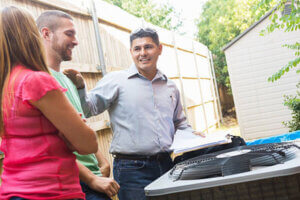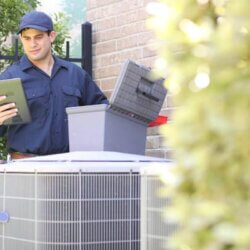
Every homeowner understands that maintaining a comfortable living environment is crucial, and your HVAC system plays a significant role in this. Understanding the costs associated with HVAC systems can be helpful during installation or maintenance/repair. Read on as we examine the components of HVAC costs and what influences them. We will also learn about the long-term benefits and financing options that can make upgrading or maintaining your HVAC system more manageable.
To learn more about HVAC costs or request a quote for HVAC system installation or maintenance in St. Louis, contact the expert at Galmiche & Sons today.
Factors Influencing HVAC Repair Costs
One major concern is HVAC repair costs for your existing system. Several factors can influence the cost of HVAC repairs. The age of your system plays a significant role. Older systems might need more expensive or hard-to-find parts. The nature of the malfunction is also important. Minor issues like clogged filters are far cheaper to fix than significant component failures like a broken compressor.
Seasonality can also affect repair costs. Demand for HVAC services typically spikes during extreme weather conditions, potentially leading to higher prices. It’s wise to schedule routine maintenance during off-peak times to keep your system running smoothly and catch issues before they become serious (and costly) problems.
Want to learn more about HVAC repair costs and how you can keep these costs in check? Read the following articles:
- Are HVAC Maintenance Contracts Worth the Money?
- One Simple Way to Avoid Costly, Surprise HVAC Repairs

A Breakdown of HVAC Installation Costs
When considering HVAC costs, another common concerns is how much will a new HVAC system installation cost. Several components contribute to the total cost of installing a new HVAC system. First, there’s the equipment itself. The price of the HVAC unit depends on the type, brand, and efficiency rating. A typical central air system might cost between $3,000 and $5,000, while a high-efficiency model could cost more upfront but offer better savings over time.
Labor costs are another significant factor in HVAC costs, ranging from $1,500 to $2,500. Installation is a skilled job requiring careful attention to ensure the system is set up correctly and operates efficiently. Additionally, there can be costs for ductwork, especially if your home needs extensive modifications to accommodate a new system. Other extras, like thermostats or advanced filtration systems, can also add to the cost. Finally, new trade tariffs may have a substantial impact on HVAC costs.
Find out how to save on HVAC installation costs
Comparing HVAC Costs: Central vs. Ductless
When installing a new HVAC system, choosing between central HVAC systems and ductless mini-splits involves comparing not only their functionalities but also their costs. Central systems are generally more economical for larger homes as they can effectively heat and cool multiple rooms. However, they require ductwork, which can be costly to install if it is not already present.
On the other hand, ductless systems are great for homes without existing ducts or for add-ons where extending ductwork isn’t feasible. They offer zone-specific temperature control and are often more energy-efficient since there’s no loss through ducts. However, the installation cost per unit can be higher.
Find out a few hacks to reduce your energy bill
Financing Options for New HVAC Systems
Investing in a new HVAC system can be a significant financial undertaking. Numerous financing options are available. Many HVAC companies offer in-house financing plans with flexible terms to spread the cost over several months or years. Utility companies often provide rebates for purchasing energy-efficient models, lowering the overall expense.
Additionally, programs like the Energy Star tax credits in the US allow for deductions on your tax return when you purchase qualifying energy-efficient equipment. It’s also worth checking with your local government or financial institutions for special financing programs or incentives for energy-saving home improvements.
The Long-Term Savings of Energy-Efficient HVAC Systems
Another factor to consider when it comes to HVAC costs is energy efficiency. While energy-efficient systems tend to cost more upfront, they can significantly reduce utility bills over time, resulting in substantial long-term savings. High-efficiency units use less electricity to heat and cool your home, reducing energy consumption and lowering your carbon footprint. With rising utility costs, upgrading to an energy-efficient system can be a wise financial decision over the unit’s lifespan.
Want to learn more about energy-efficient HVAC systems? Also read:
- Energy-Efficient HVAC Options to Upgrade Your Comfort, Not Your Heating Bill
- Maximizing Energy Efficiency with Routine HVAC Service Maintenance: Benefits You Should Know
- Understanding SEER Ratings: Choosing an Energy-Efficient AC Unit
Contact Galmiche & Sons for More Information on HVAC Costs
With decades of experience providing quality heating, cooling, and air-quality services, Galmiche & Sons understands the importance of finding the right system for your home on a budget. Our experienced and qualified technicians can offer customized solutions for your HVAC system at affordable prices without compromising quality.
Get in touch with us today for more information on HVAC costs or to request a quote for your heating and air conditioning services.









